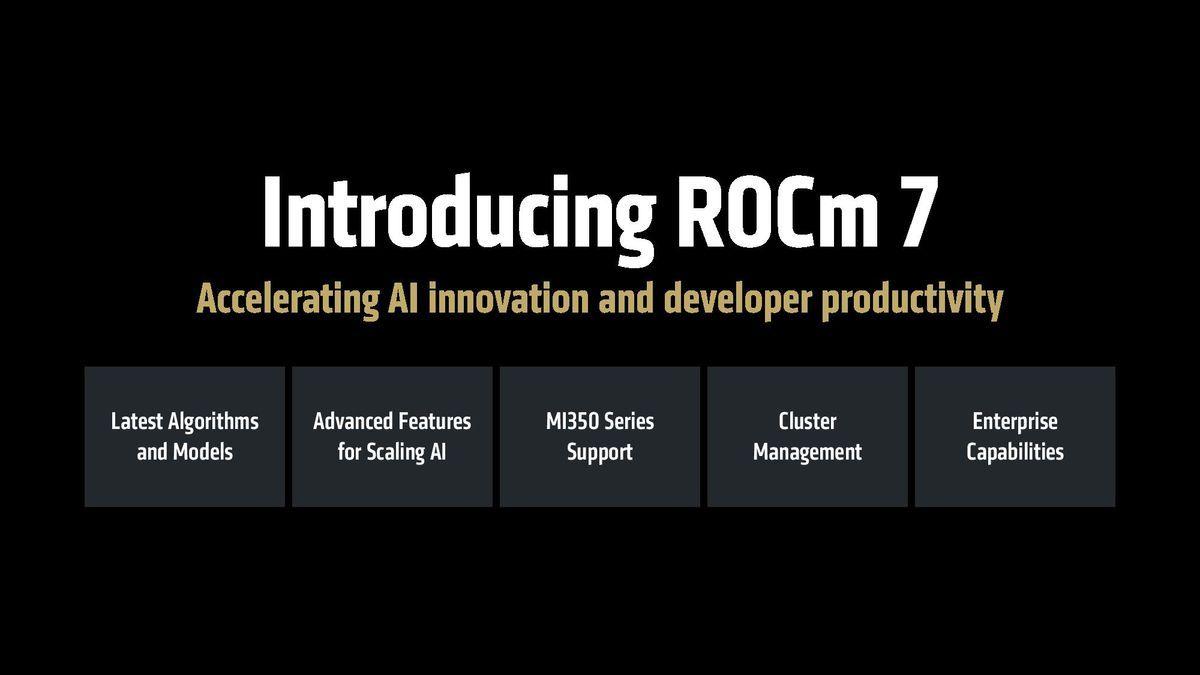ZLUDA Open-Source Library Revived: Aims to Enable CUDA-Based AI Workloads on Multiple GPU Architectures
2 Sources
2 Sources
[1]
Open-Source Library ZLUDA Makes a Comeback, Now Working On Multi-GPU Compatibility For AI Workloads
ZLUDA, the famous "code porting" library, has now seen its revival and is now being developed to support "multi-GPU" compatibility, especially for AI workloads. For those unaware, the ZLUDA library made headlines a few months ago, and it was initially designed to support Intel GPUs on NVIDIA's software stack, but eventually, AMD took care of the project and, together with multiple developers, molded it in a way that allowed them to break boundaries and access NVIDIA's CUDA onto their own AI hardware, which was seen as a massive breakthrough for the open-source community. However, AMD decided to scrap the project due to legal concerns, but ZLUDA is back, this time with a bang. A new report by Phoronix claims that ZLUDA's original developer, Andrzej Janik, has announced that ZLUDA is back to its development phase under an anonymous sponsor, but there is pretty interesting stuff to come ahead for ZLUDA, which we'll talk about next. It is claimed that ZLUDA is now being tuned to allow multi-GPU support, which means that the library will be compatible with any architecture, whether AMD or NVIDIA. Now, instead of optimizing for professional workloads, ZLUDA will focus on AI/ML workloads. This means that the ZLUDA will now support libraries such as Llama.cpp, PyTorch, and TensorFlow, and the special focus is reworking NVIDIA code paths to make them compatible with other GPU vendors. The involved developers have already started testing too with AMD's RDNA GPUs, and it is said that ZLUDA will support RDNA1+ architectures along with ROCm 6.1+ compute stack support; hence, for the AMD compute portfolio, ZLUDA will prove to be a game-changer. Now, in terms of when the library will appear back in the markets, the developer Janik claims that it will take around a year before the library comes back in shape. If the project proves to be a success, we might see the exclusivity boundaries present in AI software stacks break, allowing architectures to leverage each other's capabilities for an optimal end result.
[2]
ZLUDA breathes new life with financial backing from unknown party -- pivots to AI workloads across multiple GPU vendors
ZLUDA, an open-source CUDA translation layer, has lived two quite vivid lives with Intel and then AMD GPUs. It was nearly killed in August when AMD asked to take down the code developed using its funds. However, as its developer, Andrzej Janik, secured funding from a mysterious sponsor, ZLUDA now has a third life. This time around, the focus of ZLUDA will be to run AI/ML software designed for CUDA GPUs on processors from other vendors using a translation layer, reports Phoronix. ZLUDA was originally designed to run creative professional CUDA-based applications on Intel and then AMD GPUs, while the upcoming iteration of ZLUDA shifts focus to accommodate AI and machine learning workloads. Also, the emphasis is now not just on Intel or AMD. Instead, it offers multiple GPU vendor support, making ZLUDA applicable across different GPU architectures. Nonetheless, for the time being, most development efforts are concentrated on AMD GPUs, particularly RDNA1 and newer architectures. Support is being built around AMD's ROCm 6.1+ compute stack, laying the foundation for broader, multi-architecture compatibility in the future. Andrzej Janik is currently working to make AI/ML frameworks like PyTorch, TensorFlow, and Llama.cpp function seamlessly using CUDA on non-Nvidia GPUs using his translation layer, according to Phoronix, who spoke to the developer. Janik predicts it will take about a year to develop the new ZLUDA code to a stable state where it can effectively handle AI/ML workloads across multiple GPUs. Contributions from the open-source community will be welcomed as the project evolves. So, ZLUDA will remain open source, or at least it looks so today. Although ZLUDA now has a financial backer, the sponsor has chosen to remain anonymous for now. We can only speculate who the sponsor is because they need to run AI workloads at scale and opted for multi-GPU vendor support. Also, we presume it is big enough not to be afraid of getting into a conflict over running CUDA software through a translation layer, which Nvidia does not endorse these days. Yet, the developer says that this 'stealth' sponsor is expected to be revealed later, providing more insight into the direction and future support of ZLUDA.
Share
Share
Copy Link
ZLUDA, an open-source CUDA translation layer, has been revived with anonymous funding. It now focuses on enabling AI/ML workloads across multiple GPU vendors, potentially breaking down exclusivity barriers in AI software stacks.

ZLUDA's Revival and New Direction
ZLUDA, the open-source "code porting" library, has been resurrected with a new focus on AI and machine learning workloads. Originally designed to support Intel GPUs on NVIDIA's software stack, ZLUDA has undergone significant changes in its development journey
1
.The project's original developer, Andrzej Janik, has announced that ZLUDA is back in development under the sponsorship of an anonymous backer. This new iteration aims to break down exclusivity barriers in AI software stacks by enabling CUDA-based AI workloads to run on GPUs from multiple vendors
2
.Multi-GPU Compatibility and AI Focus
The revived ZLUDA is being developed with a focus on multi-GPU compatibility, particularly for AI workloads. This means the library will be designed to work with various GPU architectures, including those from AMD and NVIDIA. The project is shifting its focus from professional workloads to AI and machine learning applications
1
.Key developments include:
- Support for AI/ML libraries such as Llama.cpp, PyTorch, and TensorFlow
- Reworking NVIDIA code paths for compatibility with other GPU vendors
- Initial testing with AMD's RDNA GPUs
- Planned support for RDNA1+ architectures and ROCm 6.1+ compute stack
1
Development Timeline and Open-Source Collaboration
Janik estimates that it will take approximately a year for the new ZLUDA code to reach a stable state capable of effectively handling AI/ML workloads across multiple GPUs. The project will remain open-source, welcoming contributions from the community as it evolves
2
.Related Stories
Potential Impact on AI Hardware Landscape
If successful, ZLUDA could significantly impact the AI hardware landscape by allowing different GPU architectures to leverage each other's capabilities. This could potentially lead to more optimal end results in AI and machine learning applications
1
.Anonymous Sponsorship and Future Revelations
While ZLUDA now has financial backing, the sponsor has chosen to remain anonymous for the time being. Speculation suggests that the sponsor may be a large entity interested in running AI workloads at scale with multi-GPU vendor support. The developer has indicated that the identity of this 'stealth' sponsor is expected to be revealed later, which could provide more insight into ZLUDA's future direction and support
2
.As ZLUDA enters this new phase of development, it has the potential to become a game-changer in the AI compute landscape, particularly for AMD's compute portfolio. The project's success could lead to a more open and flexible environment for AI and machine learning workloads across different GPU architectures.
References
Summarized by
Navi
[1]
Related Stories
Recent Highlights
1
Google Gemini 3.1 Pro doubles reasoning score, beats rivals in key AI benchmarks
Technology

2
ByteDance's Seedance 2.0 AI video generator triggers copyright infringement battle with Hollywood
Policy and Regulation

3
ChatGPT cracks decades-old gluon amplitude puzzle, marking AI's first major theoretical physics win
Science and Research








